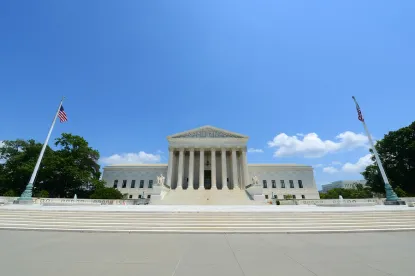The Supreme Court of the United States, on Friday, January 12, 2018, agreed to decide whether the former practice of the Securities and Exchange Commission (SEC) of having its chief judge appoint administrative law judges (ALJs) comports with the Appointments Clause of the U.S. Constitution. The Court granted certiorari in Lucia v. SEC, in which an equally-divided D.C. Circuit sitting en banc upheld the SEC’s practice, disagreeing with a Tenth Circuit decision.
The case involves the validity of the appointments of five SEC ALJs under the Constitution’s Appointments Clause, which requires that an “inferior Officer” be appointed by the president or, if permitted by statute, by the “Head” of a department. (The complete text of the clause is set out below.)
Until November 2017, the Justice Department had supported the SEC and argued that their ALJs are not “officers” subject to the Appointments Clause. But in response to the certiorari petition, it told the Court that it had changed its mind and was now taking the position that ALJs are such “officers.”
The Court’s decision is not likely to affect employers challenging OSHA or MSHA citations, however. The key fact in the SEC challenge is that the SEC ALJs were appointed by the SEC’s Chief Judge, who is not a “Head” of the SEC. By contrast, Occupational Safety and Health Review Commission (OSHRC) ALJs are appointed by the OSHRC’s chairman, who is a “Head” and thus satisfies the requirement of the Appointments Clause.
Although Federal Mine Safety and Health Review Commission (FMSHRC) ALJs are collectively appointed by the “Commission” rather than the chairman, the Commission’s members together constitute an agency “head.” In Free Enter. Fund v. Public Company Oversight Board, 561 U.S. 477, 512-13 (2010), the Supreme Court held that SEC Commissioners acting as a body constitute a “Head of Department” under the Clause. That case also held that free-standing agencies such as the SEC (and presumably the OSHRC and the FMSHRC) constitute a “Department” within the meaning of the Appointments Clause.
For similar reasons, the case is unlikely to affect ALJs of the National Labor Relations Board.
As for the SEC, any decision would now be mostly academic because the SEC has formally ratified the challenged ALJ appointments. The Court took the case anyway.
Here is the text of the Appointments Clause (U.S. Const. art. II, § 2, cl. 2):
[The President] shall nominate, and by and with the Advice and Consent of the Senate, shall appoint Ambassadors, other public Ministers and Consuls, Judges of the supreme Court, and all other Officers of the United States, whose Appointments are not herein otherwise provided for, and which shall be established by Law: but the Congress may by Law vest the Appointment of such inferior Officers, as they think proper, in the President alone, in the Courts of Law, or in the Heads of Departments.




 />i
/>i

